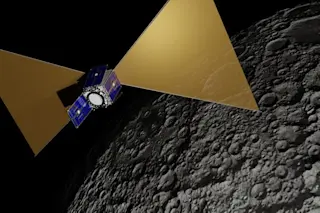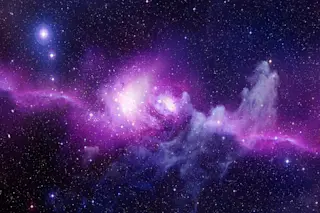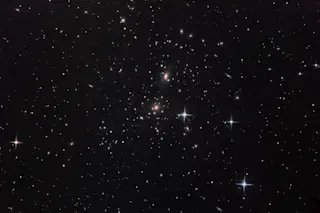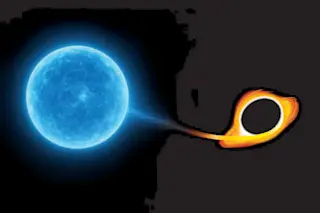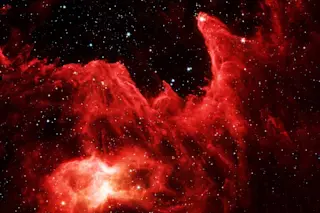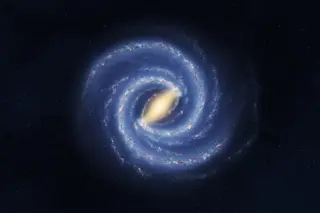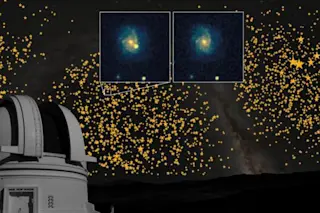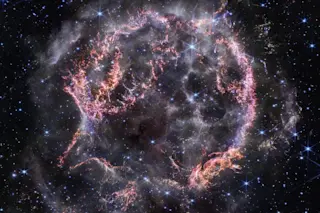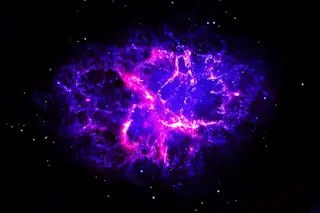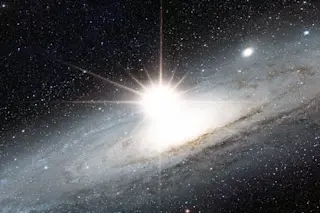Back in 1998, astronomers made a curious discovery. By studying the behavior of distant supernovas, they concluded that the universe is not just expanding, but that this expansion is accelerating. The cosmos, they concluded, is exploding.
The discovery rocked cosmology. It implied that the universe would probably experience a long cold death as its components raced inexorably away from each other. It also raised the question of what was causing this acceleration. Cosmologists eventually decided that the expansion was being driven by a force they called dark energy and began to develop a cosmological model that could account for it, called the Lambda-Cold Dark Matter (ΛCDM) model.
The story reached a climax in 2011 when the astronomers behind the discovery were awarded the Nobel Prize for physics. But important questions remain and understanding this enigmatic phenomenon has since been a central challenge for modern cosmology.
Dark Illusion
Now the puzzle may finally be drawing to a close thanks to the work of Antonia Seifert and colleagues at the University of Canterbury in New Zealand. This group has analyzed the most recent and most comprehensive observations of type-Ia supernovas and say the evidence is consistent with a model of the universe that isn’t exploding after all. In other words, dark energy is merely an illusion.
“These results provide evidence for a need to revisit the foundations of theoretical and observational cosmology,” say the team.
At the heart of this debate is the distinction between the Friedmann-Lemaître-Robertson-Walker model and a different model called “timescape” cosmology put forward by David Wiltshire and others in 2007 (Wiltshire is one of the authors of the new paper).
The Friedmann et al model assumes the universe is homogeneous on the largest scales so that light propagates evenly in all directions. But various theorists have pointed out that the universe is far from homogeneous and instead peppered with high density galaxies and giant voids that form into giant filamentary-type structures on an even larger scale.
Galaxies are well known to bend and distort light waves, and some cosmologists say the voids must do as well and have developed the mathematical tools to study how this might make the universe look to observers on Earth.
Wiltshire’s contribution is a model based on this thinking called timescape cosmology that explores how the variations in gravitational forces across the universe can make time slow down for light waves. The effect is to make type-Ia supernovas look further away than expected and so appear to be moving faster. All this, he said, would create the illusion that the universe was exploding when, in actuality, the expansion of the universe might be slowing. Crucially, this perspective eliminates the need for dark energy.
Of course, the ultimate test for cosmological theories is whether they are backed by observational evidence. So to test the timescape hypothesis, Seifert, Wiltshire, and co-conducted a model-independent analysis of the most extensive compilation of type-Ia supernovae observations to date, called the Pantheon+ dataset.
Type-Ia supernovae are crucial here because they have a consistent intrinsic brightness that allows astronomers to determine their distance accurately.
Seifert and co compared the predictions of the ΛCDM model and the timescape model. The analysis revealed strong evidence favoring the timescape model. Notably, the Bayes factor — a statistical metric used to compare models — indicated a decisive preference for the timescape cosmology over ΛCDM. “When considering the entire Pantheon+ sample, we find very strong evidence in favor of timescape over ΛCDM,” say Seifert and co.
Nuanced Theory
Of course, other groups will need to validate and repeat these findings. But if validated, the implications are profound. Dark energy, the distinct force driving the universe's acceleration, would be rendered unnecessary. Instead, the observed effects would stem from a nuanced understanding of general relativity applied to a clumpy, inhomogeneous universe.
That means cosmologists will need to revise the ΛCDM model, which has been the cornerstone of modern cosmology for decades. The ΛCDM model incorporates dark energy using the cosmological constant, Λ, but it also attempts to account for the powerful gravitational effects thought to be generated by cold dark matter, even though they have yet to observe dark matter directly. If dark energy is indeed an illusion, cosmologists will have to revisit this paradigm.
That will be a relief for physicists who have long pondered how the universe can create so much energy — dark or otherwise— seemingly from nowhere.
The paper by Seifert and co is by no means the last word. But they emphasize that their results are a compelling case for reevaluating the foundations of theoretical and observational cosmology. “Our results imply profound consequences for cosmology and astrophysics,” say Seifert and co. Whether dark energy will ultimately remain a cornerstone of cosmology or fade into history as an illusion of perception remains to be seen, but either way, the journey ahead looks exciting.
Ref: Supernovae evidence for foundational change to cosmological models: arxiv.org/abs/2412.15143



